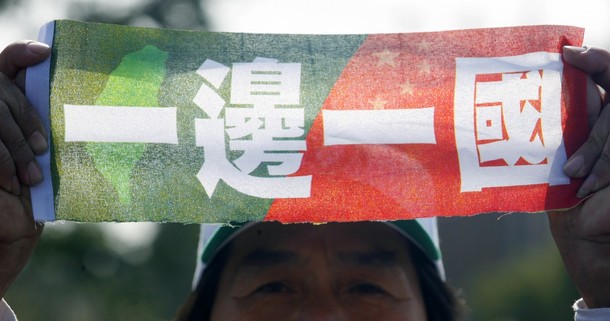Taiwan fears China trade deal could cost jobs

Radio Australia | December 15, 2009
Taiwan fears China trade deal could cost jobs
Unions in Taiwan say they fear there could be huge job losses if a proposed free trade agreement is signed with mainland China. Talks on the deal are scheduled for next week between senior officials from Beijing and Taipei. The last round of talks in 2008 sparked violent protests, and the issue continues to divide Taiwan’s citizens along political and business lines.
– Presenter: Liam Cochrane
– Speakers: Tony Phoo, Standard Chartered Bank, Taiwan; Su Yi Chih, deputy secretary general, National Federation of Bank Employees Union
– Listen: Windows Media
COCHRANE: Depending on who you ask, a new trade agreement with China could mean opening up new horizons for constrained Taiwanese businesses, or it could lead to Chinese companies and workers swamping the island. Tony Phoo, an analyst at Standard Chartered bank in Taiwan, looks on the bright side.
PHOO: If you look at it from a longer term perspective, I think the banking industry are the likely ones to be benefiting most, given the home conditions where the market is clearly overcrowded, so I think the access to the mainland Chinese market market clearly opens up an avenue for improving revenues and possibly even profits for Taiwanese banks.
COCHRANE: Whereas Su Yi Chih, deputy secretary general of the National Federation of Bank Employees Union, sees things differently.
SU: We’re concerned that lots of enterprises from China will occupy the smaller and medium enterprises in Taiwan and eventually those cheaper and probably higher quality personnel will take [their] place and make more job losses in Taiwan.
COCHRANE: Su Yi Chih stresses that the bank worker’s union is still discussing its position on the ECFA - the Economic Cooperation Framework Agreement. In fact, the agreement itself is very much still under discussion, with no final deal expected for some months, at the earliest.
Next week’s talks will focus on specific issues - like how to avoid double taxing companies, inspecting farm produce, fishing cooperation and coordinating industry standards. Analysts say it might also indicate the first sectors to be included in any future deal, with market watchers guessing the so-called "early harvest" industries could include auto-parts, textiles, petro-chemicals and banks.
Taiwan’s Premier has said Chinese banks would not be allowed to take over Taiwanese banks; they’d only be permitted to open up branches. But the union is worried that local banks simply wont be able to compete with huge Chinese firms - some of which already have customer bases bigger than the entire Taiwanese populations. Tony Phoo says some of the market shifts are inevitable and must be embraced.
PHOO: With or without the ECFA, Taiwanese have to face the reality will be lost, but at least with the ECFA agreement you run the possibility that some new jobs will be created and that would actually help cushion the potential blow from the sort of job losses that may actually arise.
COCHRANE: It seems some Taiwanese businesses are already itching to trade more with China. For example, in April, the Taiwanese phone company Far EasTone announced plans to sell a 12 per cent stake to China Mobile, freeing up cash for a new business to sell mobile software and services on the mainland. Even though the deal is not allowed under current laws, the mere prospect of it caused a tsunami on Taiwan’s stock market, with the biggest single-day rise in 18 years.
While it’s unlikely that electronics will be included in the first phase of any deal early next year, it shows the allure of China’s huge and growing market. But the debate is not all about economics, with some Taiwanese suspicious that China might use a free trade agreement to slowly exert more power over the island nation, that it claims as it’s own territory.
SU: The question should be that, ’Is it [China] interested in the local and small market in Taiwan? Their motives of having branches in Taiwan, what is their motives? Is it political or they really want to have some real businesses in Taiwan?’
COCHRANE: Tony Phoo from Standard Chartered bank says Taiwan’s economy is inevitably entwined in politics.
PHOO: Any issues pertaining to cross-strait relations, you always draw the both extremes. One would be highly supportive and then you have possibly another camp whereby they are obstructive of such closer relations, and it’s something that the government will have to learn to manage.





